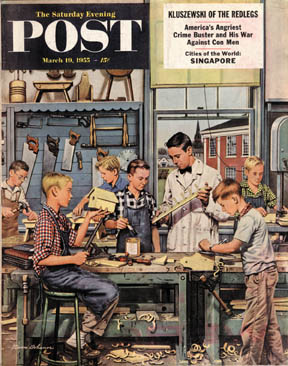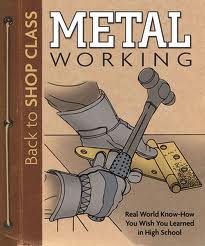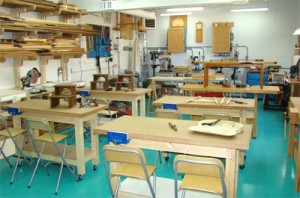Shop Classes Should Be Central in the School Curriculum
 I had a full year of wood shop in 7th grade, another year of metal shop in the 8th, yet another for electric shop in the 9th. They would be in the top ten courses I ever took, including college. Why? Because they gave me lifelong skills that I’ve continued to build upon over the years.
I had a full year of wood shop in 7th grade, another year of metal shop in the 8th, yet another for electric shop in the 9th. They would be in the top ten courses I ever took, including college. Why? Because they gave me lifelong skills that I’ve continued to build upon over the years.
Shop courses can also include working on computers, fixing cars, repairing small engines, gunsmithing, software applications, even “home economics” courses involving cooking, gardening, plumbing, sewing, and any other useful how-to activities that can make “handymen” of us all. Isn’t education supposed to be about laying foundations that will benefit us all throughout our lives? Isn’t  there an existential confidence and earned self-esteem that accompanies such courses, at once raising quality-of-life options for both genders.
there an existential confidence and earned self-esteem that accompanies such courses, at once raising quality-of-life options for both genders.
Families used to be much more intact than they are today. Mothers were home managers who could teach daughters how to cook and sew. Fathers could teach sons the art of fixing things. Extended families were also more in evidence, perhaps with grandfathers and uncles adding to the lore that goes with working with tools. Learning how to repair, do canning, and be generally self-reliant always was taken for granted on the frontier and in farm families. Colonial children could often walk right into the father’s “business” located in the front of the home.
Today both parents work, and don’t have time to fix things. It’s taken to a “technician” at some repair shop, where the work can be pricey and of dubious quality. Those who outsource repair tasks, of course, lose skill sets that former generations passed on from generation to generation. If you don’t know how to clean a fish, then you probably won’t go fishing, remaining locked into the salary treadmill, never having time to enjoy the serene periods that angling makes possible.
 Yes, there are whole television networks devoted to do-it-yourself projects, not to mention similar departments in bookstores. But these are passive, a bit like trying to learn how to play the piano by watching a YouTube video or reading a manual, all of which are good supplementally but never a substitute for what hands-on classes provide systematically over time.
Yes, there are whole television networks devoted to do-it-yourself projects, not to mention similar departments in bookstores. But these are passive, a bit like trying to learn how to play the piano by watching a YouTube video or reading a manual, all of which are good supplementally but never a substitute for what hands-on classes provide systematically over time.
If there are any high schools where students are less motivated or under-performing, then communities should consider remaking them into vocational high schools. Guess what, you’ll see job unemployment plummet as students discover legitimate alternatives to making an honest living. Too many young people are being channeled into colleges to earn often meaningless degrees after four years of taking courses which benefit the faculty incomes more than anything else. If higher education is in the offing, the technical institutes after high school are a far better investment.
Well meaning parents and misguided counselors are known to denigrate the dignity of labor that Henry David Thoreau so cogently wrote about in connection with his bean field. No question, farming and working with your hands brings immense satisfaction. Never allow snobs or elitists of any ilk the opportunity to disparage the importance of shop, industrial arts, or home economics curricula. Better yet, get on the school board and become an advocate.
Larry Pierce comment: I certainly agree, and have written a book that will hopefully get people ‘fixing’ again: ”The Art of Fixing Things.”
 I had a full year of wood shop in 7th grade, another year of metal shop in the 8th, yet another for electric shop in the 9th. They would be in the top ten courses I ever took, including college. Why? Because they gave me lifelong skills that I’ve continued to build upon over the years.
I had a full year of wood shop in 7th grade, another year of metal shop in the 8th, yet another for electric shop in the 9th. They would be in the top ten courses I ever took, including college. Why? Because they gave me lifelong skills that I’ve continued to build upon over the years. there an existential confidence and earned self-esteem that accompanies such courses, at once raising quality-of-life options for both genders.
there an existential confidence and earned self-esteem that accompanies such courses, at once raising quality-of-life options for both genders. Yes, there are whole television networks devoted to do-it-yourself projects, not to mention similar departments in bookstores. But these are passive, a bit like trying to learn how to play the piano by watching a YouTube video or reading a manual, all of which are good supplementally but never a substitute for what hands-on classes provide systematically over time.
Yes, there are whole television networks devoted to do-it-yourself projects, not to mention similar departments in bookstores. But these are passive, a bit like trying to learn how to play the piano by watching a YouTube video or reading a manual, all of which are good supplementally but never a substitute for what hands-on classes provide systematically over time.